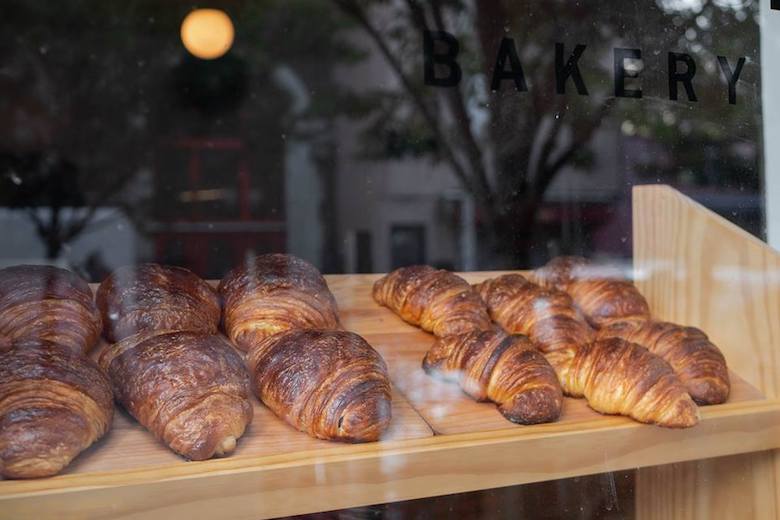
Nicholas Heavican was on a family vacation in Reykjavik with his family when he became an accidental baker. The combined notes of sourdough bread steaming under high heat and butter croissants growing crispy in the oven spilled from the building. A rusted two-speed bicycle sat outside, a sign reading Braud & Co. hanging from the frame. A mural painted in bright hues reminiscent of Haight-Ashbury covered its facade, an otherwise typical example of Reykjavik’s two-story architecture with its gabled roof and dormers.
Heavican had never planned to become a baker. He took pleasure in cooking for friends and family, but his experience folding dough, mastering ratios and fermenting flour was limited. “I had never baked a thing in my life besides cookies with my grandmother,” he said. The seeded sourdough bread that he tasted at Braud & Co. in the spring of 2016 sparked an unexpected—but desired—reorientation of his life and work. Eighteen years as a photographer in New York had left him hungry for something else.
The minute he absorbed the flavor and texture of the crumb, the caramel-rich notes of the dark-brown crust, and the pop of blistered pumpkin seeds, he knew that this was it. Heavican decided then and there that he had to learn how to make this bread.
It’s all about the process
At the encouragement of his wife, he went back the next day and asked for an internship. Unbeknownst to him at the time, the bakery had only been open for two weeks. Its owner and founder, who had trained for several years in Copenhagen, invited him back with open arms. A few months later, Heavican returned to Reykjavik where he spent three months learning the ins and outs of baking and bakery life.
Read more: How to Make a Sourdough Starter from Scratch
“Baking wasn’t so terrifying as I made it up to be,” Heavican said. “Ágúst Einþórsson, the main baker, taught me. He came at baking with this super free approach. He doesn’t know the protein levels; he doesn’t know the calorie levels and frankly is not that interested in them.” Baking, he found, depended on process in much the same way as photography: both were equal parts science geeks and cool kids taking a free, creative approach. Heavican came to see the bakery as an experimental lab where he could play with recipes, tweak and experiment with taste, texture and timing.

Bring it on home
A few months later, Heavican returned to East Williamsburg, Brooklyn, to found his own bakery, Nick + Sons. He started baking every day at home before arranging to lease the kitchen at a Brooklyn pizzeria after hours a few days a week. That setup served him for several months before he found a space of his own around the corner from his apartment in early 2018.
Slated to open on May 1, the bakery will feature four breads: his (slightly tweaked) version of the inspirational seeded sourdough, hot dog and hamburger buns and traditional baguette. He plans to offer simple pastries like croissants and cinnamon buns, too.
When I visited the space, he had just installed the oven—the same Italian model he learned to bake on in Iceland. Heavican often works alone, but 20 hours a week an intern joins him in the bakery. He partners with Get Out Stay Out, a nonprofit that provides job-training opportunities to young men who have been in the criminal justice system.
According to his new landlord, the ground level space was originally one of several neighborhood bakeries servicing the local Italian community. One nearby storefront, now a vintage clothing shop, preserved its vintage “Grand Street Bakery” sign. While the breads are different, Heavican values the community aspect of his business. Many of his wholesale clients are nearby specialty food shops—among them the Meat Hook, where the hamburger and hot dog buns do especially well.
The space of his own will provide Heavican with the resources and tools he needs to grow. Already, he’s been able to streamline the process. Rather than splitting a batch of hamburger buns into pieces of equal weights manually, he invested in a divider that separates the dough into evenly sized pieces, he explained as he shaped them into identical domes. The oven will bake more loaves at a time more quickly than he could manage otherwise. Nevertheless, he feels he’s barely scratching the surface in terms of output. “When the oven is on eight hours a day,” he said, “then I’ll be in a good place.”
Photos courtesy of Nick + Sons.



